
Philip Kindred Dick was an American writer known for his work in science fiction. He wrote 44 published novels and approximately 121 short stories, most of which appeared in science fiction magazines during his lifetime. His fiction explored varied philosophical and social themes, and featured recurrent elements such as alternate realities, simulacra, monopolistic corporations, drug abuse, authoritarian governments, and altered states of consciousness. His work was concerned with questions surrounding the nature of reality, perception, human nature, and identity.
"Second Variety" is a science fiction novelette by American writer Philip K. Dick, first published in Space Science Fiction magazine, in May 1953. Set in a world where war between the Soviet Union and United Nations has reduced most of the world to a barren wasteland, the story concerns the discovery, by the few remaining soldiers left, that self-replicating robots originally built to assassinate Soviet agents have gained sentience and are now plotting against both sides. It is one of many stories by Dick to examine the implications of nuclear war, particularly after it has destroyed much or all of the planet.

Parker Brothers is the main board game division of Hasbro, formerly an American toy and game manufacturer which in 1991 became a brand of Hasbro. More than 1,800 games were published under the Parker Brothers name since 1883. Among its products were Monopoly, Clue, Sorry!, Risk, Trivial Pursuit, Ouija, Aggravation, Bop It, and Probe. The trade name became defunct with former products being marketed under the "Hasbro Gaming" label. However, in 2017, Hasbro revived the brand with the release of several new games which bear similarities with those of some of its previous, better-known products.
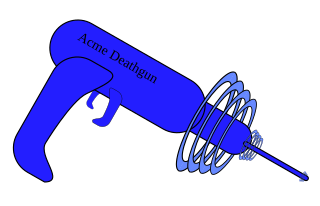
Strange and exotic weapons are a recurring feature in science fiction. In some cases, weapons first introduced in science fiction have been made a reality; other science fiction weapons remain purely fictional, and are often beyond the realms of known physical possibility.
Anti-Monopoly is a board game made by San Francisco State University Professor Ralph Anspach in response to Monopoly. The idea of an anti-monopoly board game dates to 1903 and the original Monopoly created by Lizzie Magie.
"Foster, You're Dead!" is a 1955 science fiction short story by American writer Philip K. Dick. It was first published in Star Science Fiction Stories No.3.
"Breakfast at Twilight" is a science fiction short story by American writer Philip K. Dick. It was received by the Scott Meredith Literary Agency on January 17, 1953 and first published in Amazing Stories, July 1954. It appears in the second volume reprint of Philip K. Dick's short stories Second Variety.
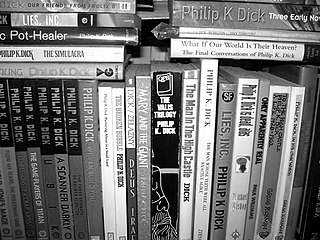
The bibliography of Philip K. Dick includes 44 novels, 121 short stories, and 14 short story collections published by American science fiction author Philip K. Dick during his lifetime.

The board game Monopoly has its origin in the early 20th century. The earliest known version of Monopoly, known as The Landlord's Game, was designed by an American, Elizabeth Magie, and first patented in 1904 but existed as early as 1902. Magie, a follower of Henry George, originally intended The Landlord's Game to illustrate the economic consequences of Ricardo's Law of Economic rent and the Georgist concepts of economic privilege and land value taxation. A series of board games was developed from 1906 through the 1930s that involved the buying and selling of land and the development of that land. By 1933, a board game had been created much like the modern version of Monopoly sold by Parker Brothers and its related companies through the rest of the 20th century, and into the 21st. Several people, mostly in the midwestern United States and near the East Coast of the United States, contributed to the game's design and evolution.
"Oh, to be a Blobel!" is a science fiction short story by American writer Philip K. Dick. It was first published in Galaxy magazine, February 1964. The plot centers on the posttraumatic psychological state of former espionage agents on both sides of the Human-Blobel war. Blobels are presented as a single-cell, protoplasmic species prevalent in the outer solar system. Espionage agents on both sides of the conflict underwent irreversible physical modifications, enabling them to assume the form of the opposing species for a defined time period each day. The story deals with the ramifications for agents' personal and social identity from this alteration.
"Expendable" is a science fiction short story by American writer Philip K. Dick. It was first published in The Magazine of Fantasy and Science Fiction issue of July 1953. The plot centers on an unnamed human being caught in the middle of the ongoing, million year conflict between the degenerate descendants of the insects and humans.
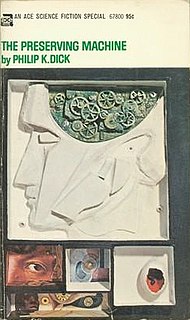
The Preserving Machine is a collection of science fiction stories by American writer Philip K. Dick. It was first published by Ace Books in 1969 with cover art by Leo and Diane Dillon as part of their Ace Science Fiction Specials series. The stories had originally appeared in the magazines Fantasy and Science Fiction, Galaxy Science Fiction, Beyond Fantasy Fiction, If, Amazing Stories, Planet Stories, Worlds of Tomorrow, Imagination and Satellite.

The Collected Stories of Philip K. Dick is a collection of 118 science fiction stories by American writer Philip K. Dick. It was first published by Underwood-Miller in 1987 as a five volume set. See Philip K. Dick bibliography for information about the mass market reprints.
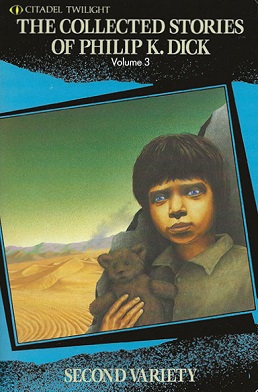
Second Variety is a collection of science fiction stories by American writer Philip K. Dick. It was first published by Citadel Twilight in 1991 and reprints Volume III of The Collected Stories of Philip K. Dick with the addition of the story "Second Variety". Many of the stories had originally appeared in the magazines If, Science Fiction Adventures, Science Fiction Stories, Orbit, Fantasy and Science Fiction, Imagination, Future, Galaxy Science Fiction, Beyond Fantasy Fiction, Satellite, Science Fiction Quarterly, Imaginative Tales and Space Science Fiction. There is huge overlap with the 1997 The Philip K. Dick Reader: stories 1–20 and 24 are identical.

The Minority Report is a re-titled collection of science fiction stories by Philip K. Dick. It was published by Gollancz and Citadel Twilight in 1991, being a reprint of Volume IV of The Collected Stories of Philip K. Dick: The Days of Perky Pat (1987). The collection The Days of Perky Pat was published in Britain in hardback by Gollancz in 1990 and in paperback by Grafton in 1991. The stories had originally appeared in the magazines Galaxy Science Fiction, Science Fiction Stories, If, Fantastic Universe, Fantasy and Science Fiction, Fantastic, Worlds of Tomorrow, Escapade and Amazing Stories.

The Eye of the Sibyl is a collection of science fiction stories by American writer Philip K. Dick. It was first published by Citadel Twilight in 1992 and reprints Volume V of The Collected Stories of Philip K. Dick, omitting the story "We Can Remember It for You Wholesale". Many of the stories had originally appeared in the magazines Worlds of Tomorrow, Galaxy Science Fiction, Amazing Stories, Fantasy and Science Fiction, Famous Science Fiction, Niekas, Rolling Stone College Papers, Interzone, Playboy, Omni and The Yuba City High Times.
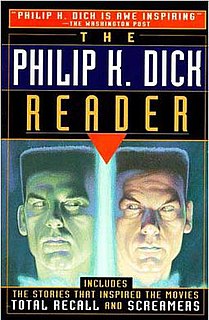
The Philip K. Dick Reader is a collection of science fiction stories by American writer Philip K. Dick. It was first published by Citadel Twilight in 1997. Many of the stories had originally appeared in the magazines If, Science Fiction Adventures, Science Fiction Stories, Orbit, Fantasy and Science Fiction, Imagination, Future, Galaxy Science Fiction, Beyond Fantasy Fiction, Satellite, Imaginative Tales, Fantastic Universe and Space Science Fiction. It is identical in content and order to the edition of volume 3 of the Collected Stories of Philip K. Dick produced by the same publisher apart from the substitution of three stories in positions 21-23 of 24 and the omission of the end notes in the Collected Stories edition. At press time, stories 21 and 24 had already been made into successful movie adaptations and stories 22 and 23 had been optioned.
"Fair Game" is a science fiction short story written by Philip K. Dick in 1953 and first published in 1959 in If Magazine. The story was re-published in the third collected volume of Dick's short stories, The Father-thing in 1987.

"Piper in the Woods" is a science fiction short story by American writer Philip K. Dick, first published in 1953 in Imagination, and later in The Collected Stories of Philip K. Dick. It has since been republished several times, including in Beyond Lies the Wub in 1988.

"The Crystal Crypt" is a science fiction short story by American writer Philip K. Dick, first published in the January 1954 edition of Planet Stories and later published in Beyond Lies the Wub in 1988.












